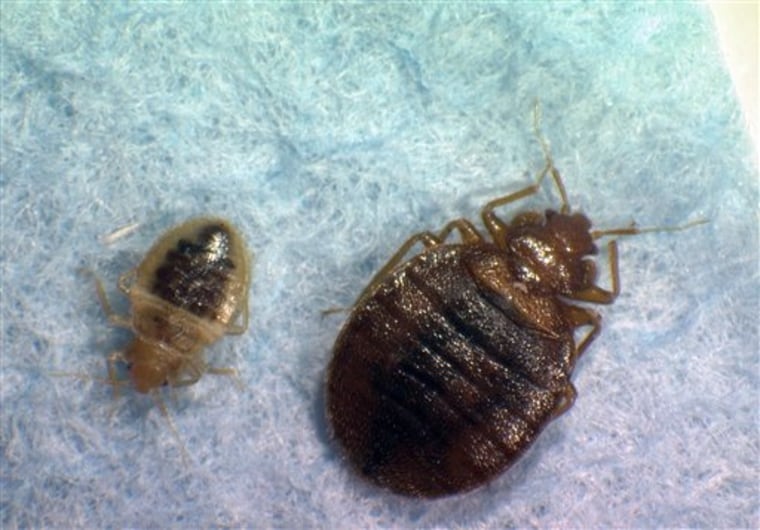Worried about bedbugs on your next hotel stay? The mere mention of the critters probably makes you itchy.
Here are some common questions about travel and bedbugs answered by bedbug expert Jody L. Gangloff-Kaufmann, urban entomologist in the integrated pest management program at Cornell University.
AP: How do you inspect a hotel room for bedbugs?
JGK: Experts say that inspection of the mattress under the sheets is good, but you're even more likely to find bedbugs in less disturbed places like the box spring and the headboard, so I make some effort to inspect these areas. I'm not especially paranoid so I don't go crazy inspecting. But even rooms that appear clean have been found to harbor bedbugs behind the headboard. And most headboards are mounted on the wall with hooks and can be lifted off and removed or replaced. Places where the box spring meets the frame are good; crevices are favorite hiding spots. And I always look between the mattress and box spring by lifting the mattress. The fecal stains are what to look for primarily, although they could be old. If those are found, it's a strong indication to either do a very thorough inspection or change rooms.
AP: Does keeping your luggage in the hotel bathroom really help protect it from bedbugs?
JGK: I keep my luggage off the bed and more towards the door. My theory is that when luggage or belongings are placed and left on the bed overnight, and bedbugs sense a person and become active, they may feed, then run and hide in the closest crevice available ... which might just happen to be a suitcase. They are not attracted to suitcases, but suitcases provide suitable habitats for bedbugs that come across them.
AP: Would it help to sleep inside a silk sleep sack, mosquito netting, or sleeping bag, assuming you could launder the bedding before bringing it home?
JGK: It might prevent a person from getting bitten if there were bedbugs in the hotel room. But I wouldn't bother, personally, because instead I inspect my room for any evidence of bedbugs. I would not want to bring potentially infested bedding back to my home. I think that increases the chances of a home infestation, even if one takes precautions of laundering those items.
AP: A number of products claim to repel bedbugs. Has any product been found to be effective?
JGK: The only thing that was studied and published in a peer-reviewed journal was standard insect repellents versus bedbugs. They found evidence that DEET is repellent to bedbugs. It makes sense that other botanicals might be repellant as well, but none is foolproof because you can't possibly cover your whole body or your entire environment with an even layer of the scent. Plus given a no-choice situation, bedbugs will likely brave it and get their meal. Also all these repellents wear off over time, so by 4 a.m., you might no longer be protected, and that's usually when they like to feed anyway.
AP: Can you really bring bedbugs home from a movie theater or airplane? Is it really possible for luggage to get infested in a cargo hold?
JGK: All a person needs to do is bring home one "gravid" female bedbug (fertilized and ready to lay eggs) and an infestation could begin. ... Females wander and can get into your personal belongings in any situation, movie theater or cargo hold. Your luggage wouldn't become infested, it just might contain a gravid female. If a person picked up a nymph (juvenile) only, they might get bitten but would not start an infestation.
AP: Are bedbugs truly a widespread problem in the hotel industry or is this a lot of hype?
JGK: It's pretty common to find bedbugs in hotel rooms. So many people I know have — my boss, my parents, New York City schools pest control director, friends. I look and have never found a bedbug in my travels. ... I think there are false reports and there is definitely hysteria, but some hotels were notorious for pretending this issue didn't exist, or worse, knowingly renting out rooms that had bedbugs ... One would hope every hotel has a protocol for dealing proactively with bedbugs today.
AP: If dogs are so good at finding bedbugs, why don't hotels have dogs go through every room?
JGK: Dogs are not foolproof, but they are a great tool. Properly trained and handled dogs can find that bedbug that nobody else can find. They have been shown to be way more effective than people at inspection. However it is unfeasible and cost-prohibitive to consider using a dog every day in each hotel room. Dogs, like people, get tired, need breaks, and don't always have the best day at work. Any job should have two dogs, for cross-verification, or a technician that finds the bug. If a hotel were to have a dog on site all the time, it would also need to have a devoted handler. The handler and dog work solely as a team. I don't think hotels consider this such a problem as to pay an employee and keep a dog just for bedbugs.
